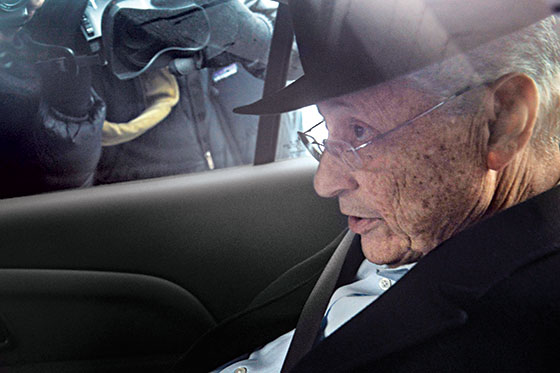 |
Sheldon Silver
(Photo: Stephanie Keith/Reuters) |
He’s lived like a fugitive for years. The longtime Speaker of the New York State Assembly, Silver frequently traveled by air from his attached apartments in the Lower East Side to Albany, routing himself through Philadelphia and Washington, D.C., to run up an estimated 168,618 frequent-flier miles in three years, at a $20,219 cost to taxpayers. The most powerful man in state government through five governors prior to his bust in January and extortion conviction last month preferred five-hour sojourns to the one-hour direct flight, though no one who knows Silver thinks he spent them reading policy memos.
He once bumped into a friend at an airport and they wound up flying together. When the flight attendant came by with peanuts, Silver took his bag, but the friend demurred. As the attendant continued up the aisle, Silver reproached him.
Take the peanuts, he insisted, an epitaph as much as it was an instruction.
Silver’s Foley Square trial grabbed headlines for weeks, with the normally dour 71-year-old smiling confidently at cameras, even as the evidence revealed he was more a contingent-fee king than a legislator, earning several times what he did as Speaker from a legal practice that never required him to cite a clause of case law. The jury found, among other things, that he had indeed funneled state grants to a doctor who delivered asbestos patients to his firm.
But defense attorney Steven Molo tried to convert Silver into a hero targeted by prosecutors who just didn’t understand how the sausage was made in Albany. A lesser person would have folded, said Molo, who presented no defense. Molo didn’t mention that Silver’s campaign committee had paid him and another Silver lawyer $1.5 million between January and June, a figure bound to end up higher still. It’s a lot easier to stand tall when someone else is paying the bill.
While Silver’s crimes are now well known, thanks to crusading U.S. Attorney Preet Bharara, it’s the small stuff that makes him special. He wrote the city’s finance commissioner to urge a rent reduction for a housing cooperative in his district without revealing that he and his relatives lived there. Caught by the New York Times using all his influence over 40 years to block affordable housing on a vacant lot near that four-building complex, effectively excluding blacks and Latinos from the area, Silver claimed the culprit was a Sheldon E. Silver, not him, a joke of a dodge blown away by the Times.
The jury that convicted Silver was the face of the city, led by a black and Latino majority, eight of them women. The 12 were a breath of fresh air in a state choking on fumes from the sausage factory, with more than 30 state leaders convicted, sanctioned, or indicted in the past ten years, enough for a caucus of their own. If his trade-offs were business as usual, the jury convicted business as usual. (Former Senate majority leader Dean Skelos was also found guilty of bribery and extortion on December 11.)
But even after Silver’s indictment, Albany was fortifying its walls. A bill introduced by Democratic reformers in the State Senate to bar elected officials from paying for their criminal defense with campaign donations can’t even find an Assembly sponsor, much less get a vote in the Senate. And the two houses agreed to conveniently disagree on whether a pol felon could still collect his pension, with the Senate passing one version of a constitutional amendment and the Assembly a different one, stalling the whole effort. The felons are still taking the peanuts.